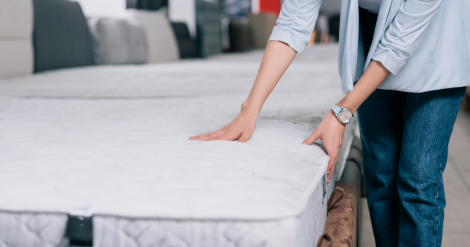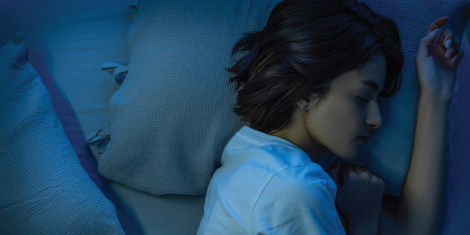No products in the cart.

Although sleep is often viewed as a luxury, many people forget the importance of sleep on the body and mind. Poor sleep is a risk factor for many diseases and conditions, including obesity, diabetes and cardiovascular disease. Try these 11 simple tips to achieve a better night’s sleep:
- Keep a regular sleep schedule: It is important to fall asleep and wake up at the same time everyday— including weekends. Although sleeping in during the weekend may feel restful initially, it will throw off your sleep schedule making Monday mornings that much more difficult. This practice coupled with getting some bright light when you first wake up will keep your circadian rhythm in check.
- Don’t over or under sleep: According to the National Sleep Foundation’s Sleep Time Recommendation Study, adults between the ages of 18-25 should get a recommended 7-9 hours of sleep per night. Older adults over the age of 65 need the least amount of sleep with a recommended 7-8 hours. The complete results of this exhaustive study include sleep recommendations for all ages.
- Exercise daily— but maybe not too close to bedtime: According to various studies one round of moderate-intensity aerobic exercise reduces the time it takes to fall asleep. In addition, people who get at least 150 minutes of exercise per week reap the additional benefits of feeling more alert and having more restful sleep. While not true for everyone, some people find it difficult to fall asleep after vigorous exercise. Examine if this is true for you and change your exercise schedule accordingly.
- Keep your bedroom between 60 and 67 degrees: Most sleep experts agree that the optimal sleep temperature is between 60-67 degrees Fahrenheit. Our bodies experience natural dips and spikes in temperature during the day. The temperature at which people fall asleep should be cool because it helps the body shed heat and thus fall into a restful sleep.
- Choose a comfortable and supportive mattress: 93% of Americans believe a comfortable mattress is important for sleep quality, according to the National Sleep Foundation’s 2012 Bedroom Poll. Make sure to invest in a comfortable and supportive mattress for your sleep and spine health. Make sure to switch out your mattress every 5-10 years to avoid unnecessary restless nights and back aches. Browse our mattress section to view some of our premium mattress selections.
- Keep the bedroom free of light and distractions: Even the smallest light can disrupt sleep patterns. Consider blackout curtains or an eye mask to shut out any light from creeping into your bedroom. Choose a fan, air purifier or white noise machine to drown out noises at night.
- Avoid alcohol, cigarettes, caffeine and heavy meals in the evening: While avoiding any caffeine within the few hours before bed may seem obvious, it’s also recommended to avoid any caffeine even in the late afternoon. Similarly the nicotine in cigarettes will cause you to be more alert at bedtime. Both alcohol and heavy meals, though often associated with inducing sleep, actually disrupt sleep patterns so the sleep you get will be less restful.
- Create a bedtime ritual: Try to engage in some form of calming activity right before you head to bed. Not only will it relax you but over time your body will begin associating it with sleep. Aromatherapy, a hot bath or meditation are a few popular options.
- Avoid hitting the snooze: As tempting as it is, hitting the snooze button multiple times will only make you more tired. The sleep between snooze cycles is not quality sleep so you’ll wake feeling more groggy and tired. Try setting your alarm to a more reasonable time and give yourself a few minutes to wake up before starting your day.
- Turn off all electronic devices an hour before bed: Scientific evidence shows that any light promotes wakefulness and can strongly affect the circadian rhythms. Try to keep all electronics off at least an hour before bedtime, especially those with blue light.
- Match your pillow to your sleep style: Thin, flat pillows are best for stomach sleepers, although this sleep position isn’t recommended for spine health. Firmer pillows are necessary for side sleepers to keep the cervical spine in alignment, especially with the addition of a pillow beneath the knees. Although experts and the public disagree on how often you should replace your pillows, the average pillow life expectancy is 12-18 months.
You might also be interested in:

-
/
Rest for Success: When to Bid Adieu to Your Old Mattress
Rest for Success: When to Bid Adieu to Your Old Mattress We spend about a third of our lives in bed, and the quality of our sleep directly impacts our overall well-being. One often overlooked factor in achieving a good night’s sleep is the condition of our mattress. As the years go by, our faithful […]
Read more
Unveiling the Truth: Busting Common Mattress Myths
Unveiling the Truth: Busting Common Mattress Myths A good night’s sleep is crucial for overall well-being, and the right mattress plays a pivotal role in achieving that. However, amidst the quest for the perfect mattress, numerous misconceptions have caused mattress shoppers confusion when searching for the right mattress. Our latest blog unravels the truth behind […]
Read more
-
/
How Medical Bed Mattresses Aid in Post-Surgery Recovery
How Medical Bed Mattresses Aid in Post-Surgery Recovery Surgery can be a daunting experience, regardless of its nature or severity. The period following a surgical procedure, known as post-surgery recovery, is crucial for achieving the best possible outcome. While factors like rest, nutrition and pain management are widely acknowledged as vital, the role that medical […]
Read more
-
/
Meeting Medical Mattress Quality Standards
Meeting Medical Mattress Quality Standards Medical mattresses are designed to meet specific quality standards to ensure patient safety, comfort and hygiene. These standards are established to address the unique needs of healthcare environments as well as the patients utilizing these mattresses. Some key quality standards for medical mattresses include: Infection Control Standards Water […]
Read more